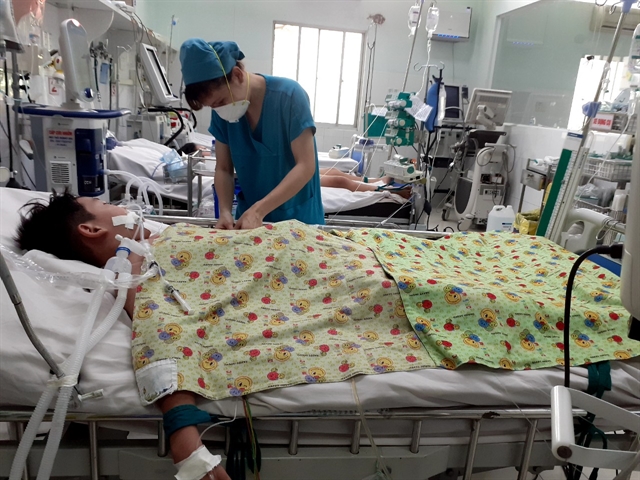
HÀ NỘI — HCM City has recorded a sharp increase in dengue fever cases among children with a high rate of severity, due to a delay in hospital admissions and improper or late treatment at home, doctors have warned.
Initial symptoms of dengue fever are quite similar to some viral infections, especially the onset of the disease can sometimes be the same as that of COVID-19. Many parents have mistaken the symptoms of the disease for COVID-19, leaving their children untreated or treated improperly.
Hospitals in HCM City have reported an increasing number of children with dengue fever, severe cases with multi-organ damage and requiring mechanical ventilation and dialysis.
At Children’s Hospital No 1, three severe dengue fever cases are under treatment at the Intensive Care Unit. The children are suffering from multi-organ damage and are on ventilators. One of them is requiring dialysis.
At the Infection Department of Children’s Hospital No 2, 40 dengue patients have been hospitalised for treatment. Of that, seven are suffering severe shock, liver damage and blood clotting disorders and two others need dialysis.
Nguyễn Đình Qui, Deputy Head of Infection Department of Children’s Hospital No 2, said the number of children with severe dengue had increased significantly compared to the same period of last year.
The rate of dengue in children had increased 2-2.5 times. Notably, severe cases accounted for about 10 -15 per cent of the total. Severe cases were between 5 and 14 years old.
Qui said there was a sharp decline in cases of mosquito-borne dengue fever last year due to COVID-19-related restrictions on people’s movements and interactions.
This year, the early rainy season led to the possible early outbreak of dengue fever, he added.
Head of the Intensive Care Unit of Children’s Hospital No 1 Phạm Văn Quang said in the first three months of this year, the number of dengue fever cases being hospitalised had increased 1.5-2 times compared to the same period last year.
In the first two weeks of this month, the hospital reported the first severe cases.
“We have received more than ten severe cases with multi-organ damages or even respiratory and cardiac arrest before being hospitalised,” he said.
Quang said most severe cases were due to late hospitalisation admission for fear of COVID-19 infection or wrong treatment at home as mistakenly taking the disease’s symptoms for COVID-19.
Figures from HCM City’s Hospital for Tropical Diseases showed that since March, there have been about 80-100 dengue patients coming to the hospital every day, with 15 per cent of them being admitted.
Until now, the hospital has received 47 children and 283 adults with dengue fever. Currently, the hospital’s departments are treating about 80-100 cases of dengue fever.
Statistics from the city’s Centre for Disease Control show that, as of mid-April, the city has recorded an alarming number of nearly 4,500 cases of dengue fever, of which 109 are severe.
The city has reported two deaths, which were both late hospitalisations.
In the outbreak of 2019, the city reported more than 20,000 cases, though severe cases were only 38.
Explaining the upsurge in the disease, Trương Hữu Khanh, vice president of the HCM City’s Union of Infectious Diseases, said that the dengue epidemic occurred every four to five years, and this year was expected to be an outbreak year.
The new normal, after a long time of COVID-19 restrictions, and the early rainy season also contributed to the outbreak.
“The rate of children getting severe dengue fever is higher than that of COVID-19 and the time from mild to severe is very quickly, requiring early detection,” he said.
According to Đỗ Châu Việt, head of the Infection Department at Children’s Hospital No 2, like other viral infections, up to 90 per cent of dengue children are treated and monitored at home and recover within seven days. Only ten per cent of severe cases require hospitalisation.
Currently, most of the severe cases are within the 8-13-year-old group.
“Children who are seriously ill are mostly due to the virus attacking the liver and kidneys and causing hemorrhagic shock. Most severe cases can be treated with timely resuscitation. However, infants and children with underlying medical conditions, such as being overweight, are likely to turn severe very quickly. Therefore, it is necessary to pay special attention to this high-risk group,” he said.
Khanh also warned that younger children could transmit dengue fever if preventive measures were not done.
Doctors warned that parents needed to recognise typical dengue symptoms such as high fever, petechiae, bleeding teeth, nosebleeds, bruises and vaginal bleeding. The disease tends to worsen on the fourth to the sixth day of illness with cardiovascular collapse, respiratory diseases and diarrhoea.
Tăng Chí Thượng, Director of the city’s Department of Health, said the department had asked all hospitals to conduct training and be alert to early identification of dengue fever. — VnExpress News
- Reduce Hair Loss with PURA D’OR Gold Label Shampoo
- Castor Oil Has Made a “Huge” Difference With Hair and Brow Growth
- Excessive hair loss in men: Signs of illness that cannot be subjective
- Dịch Vụ SEO Website ở Los Angeles, CA: đưa trang web doanh nghiệp bạn lên top Google
- Nails Salon Sierra Madre
 VnExpress News The News Gateway of Vietnam
VnExpress News The News Gateway of Vietnam





